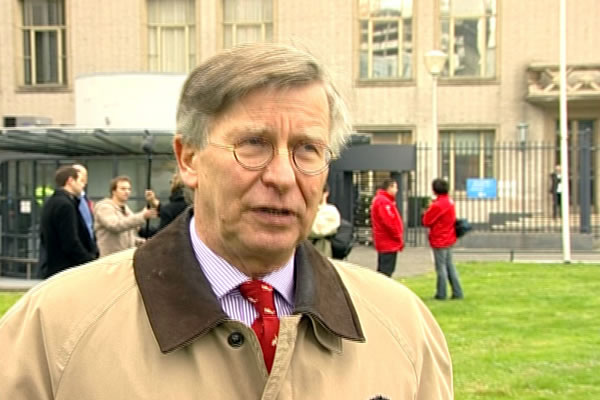Home
WLADIMIROFF: TRIBUNAL’S WISE MOVE
Eminent Dutch lawyer Michail Wladimiroff, who defended the first accused to be tried before the Tribunal and acted as amicus curiae in the Slobodan Milosevic case, contends that the Tribunal made a wise move when it decided not to go to war with the accused on the first day of his trial over a minor issue; the court was due to hear just the opening statement. The real trial has not started yet
 Michail Wladimiroff
Michail Wladimiroff Although admittedly ‘a bit surprised by the ease’ with which the judges conducted and concluded today’s hearing in the Radovan Karadzic case, eminent Dutch lawyer Michail Wladimiroff thinks they acted ‘wisely’.
‘I think that the Tribunal wisely asked itself why the Trial Chamber should start a war on the first day over such a minor issue’, Wladimiroff said after the hearing. The opening statement, Wladimiroff went on, ‘is not the actual trial; why not try to convince the accused to join in actively later on. The accused after all said that he didn’t want to block the trial, and that he wanted to take part in it. Why not offer him a hand he could accept, if not today then next week. They were off to a slow start, and in my opinion it was a wise thing to do’.
According to Wladimiroff, it is not a matter of prestige, where there are winners and losers; if that were the case, ‘people could say that the Tribunal lost today’. Rather, it is a matter of looking for a solution for an unpleasant situation that the Tribunal has found itself in, thanks in part to some previous decisions it has taken in cases where the accused have defended themselves, primarily in the case of Vojislav Seselj.
‘If you look at the Tribunal’s jurisprudence, their hands are tied, there’s no doubt about that. They couldn’t do anything but what they did today’, Wladimiroff added. In 1996 Wladimiroff defended Dusko Tadic in the first case before the Tribunal. In 2002 and 2003, Wladimiroff was amicus curiae in the Slobodan Milosevic case. In accordance with the decisions of the Appeals Chamber in the Seselj case, before the judges take measures against the accused who ‘essentially and persistently obstruct the trial’, they must seek explanations, deliver clear warnings and negotiate with the accused. According to Wladimiroff, this is ‘a total waste of time’.
Wladimiroff believes that in the next week or two, before the trial begins for real with the prosecution case, the judges will find a solution for the problem caused by the Tribunal’s jurisprudence. The Dutch lawyer notes ‘the accused has the right, but not an obligation to attend the trial. If an accused decides not to exercise the right, they can be told, ‘Well, mate, that’s your problem’.
The same, in Wladimiroff’s opinion, goes for any accused representing themselves. ‘The accused in this case decided to defend himself and if he stands by his choice, he now has to bear consequences of his choice’.
Linked Reports
- Case : Karadzic
- 2009-10-22 KARADZIC TRIAL TO START ON MONDAY, WITH OR WITHOUT HIM
- 2009-10-22 KARADZIC TO BOYCOTT TRIAL
- 2009-10-21 KARADZIC’S MOTION TO RECUSE JUDGE BAIRD REJECTED
- 2009-10-27 KARADZIC’S ABSENCE TANTAMOUNT TO ‘WAIVER OF HIS RIGHT TO ATTEND HIS TRIAL’
- 2009-10-27 KARADZIC VS. KARADZIC
- 2009-11-02 KARADZIC AND SREBRENICA GENOCIDE
